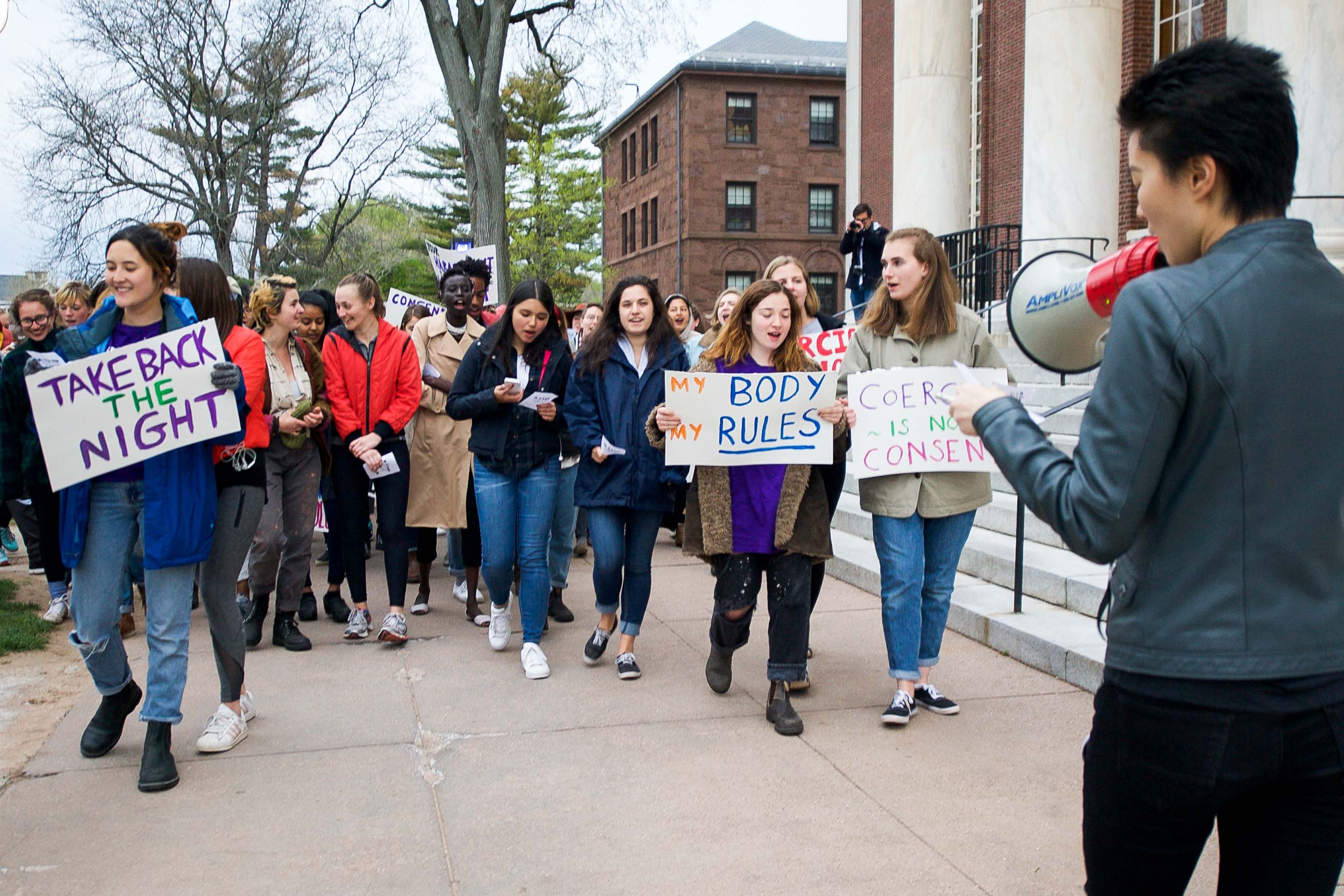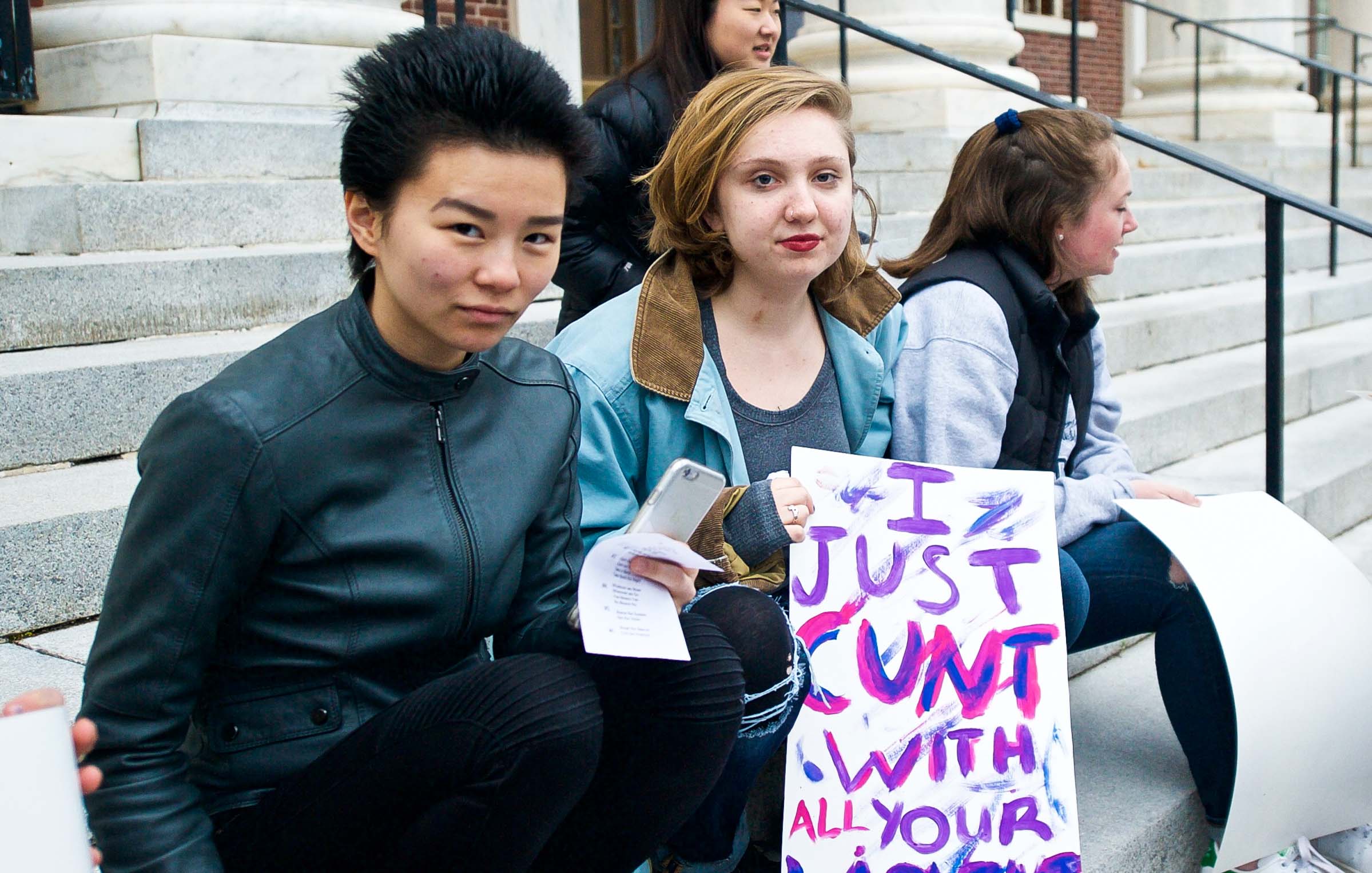On Thursday, a Take Back the Night March, organized by Students for Consent and Communication (SFCC), began at Olin Library and made its way throughout campus. The marchers assembled, carrying signs bearing slogans such as “Fuck Rape Culture,” “Your Harassment is Not a Compliment,” and “Consent is Mandatory.”
Take Back the Night first began in the 1970s, with a focus on ending the violence women faced while walking outside at night. Today, the event is held in over 30 different countries across the world and has expanded its focus toward eliminating all forms of sexual and domestic violence.
A Take Back the Night zine distributed at the event defined sexual assault as any unwanted sexual contact or activity and may include sexual penetration, attempted rape, sexual coercion, sexual contract with a child, touching above or under clothes, watching private sexual acts without consent, sexual harassment or threats, and forcing another to pose for sexual photos.
According to the zine, the night’s rally was dedicated to “every person who has faced unwanted intimate or sexual experience, with an emphasis on including people affected by intimate partner violence.” SFCC leaders spoke about the importance of emphasizing the agency of the person who was assaulted, noting that not all people who have experienced assault choose to describe themselves as survivors or victims. Returning to the topic of intimate partner violence, SFCC leaders specified that not all relationships are sexual, romantic, or proximate before listing several examples of intimate partner violence, such as undermining one’s self-worth, pressuring one to sext, and removing a condom during intercourse without consent.
SFCC leader Jennie He ’16 led the march. The march headed toward High St., past North College and Usdan, and featured chants like “Break the silence, end the violence,” and “Blame the system, not the victim,” to name a few. Marchers reassembled by a stage set up at the base of Foss Hill, and the night’s events included a performing arts element, allowing for a more nuanced event.
“Not everyone thinks of sexual assault as something that’s weighing you down, or super dramatic and life-changing or whatever,” He said. “Some people feel indifferent, some people feel angry, and some people feel just deeply reflective. We just wanted to allow people all of those different outlets, [for] all of those different feelings.”
Jennifer Gagné ’19, who attended the event, agreed.
“[The performance] was a great way to start the event because it invited anyone—an ally, a survivor—in to it, and allowed for intimacy in the circles,” Gagné said. “That was very important.”
Destiny Polk ’19 started off the night’s performances with a poetry reading.
“I am overwhelmed, overstimulated, overloaded, overloved, and over love,” Polk recited in her poem. “Overthrown. Thrown off this throne of comfortability. Where is my ability to say no to certain people?”
The crowd was silent as Polk continued.
“And then, in daylight or in darkness, I am reminded that I am wanted,” Polk said. “I am wanted, like a piece of sea-glass: broken, worn, yet beautiful enough to catch someone’s eye.”
The New Group, an a cappella group on campus, performed next, singing a series of plaintive songs about love, loss, and longing. Nate Ko ’18 followed, playing two songs on violin to wrap up the performance section of Take Back the Night.
Event attendees then headed to the Center for Arts (CFA) green for a speak-out circle. As the last shreds of daylight faded away, the circle was transformed into a platform for people to share their stories.
“It [gives] people the chance to kind of take back the night, share their stories in a powerful, meaningful way where folks listen and can be heard and believed,” said SFCC Leader Nina Gurak ’16. “It’s a way that we can make space in a weekend or a night for folks to openly talk about and engage with those issues in a meaningful way by listening to their peers.”
Take Back the Night provided a space where speakers knew their voices would be listened to and taken seriously. Martha Mastrianni ’18 agreed with this sentiment.
“I went through the Title IX process at Wesleyan, and I am one of the lucky ones,” Mastrianni said. “I met with the right people in the administration and they were able to help me in a really great way. I just want that to be something that happens for everybody. I don’t want people to feel like the Wesleyan system is unfair. I don’t want to be one of the lucky ones. I don’t want [my experience to be] the exception.”
Resources for people affected by sexual assault or intimate partner violence include Wesleyan Counseling and Psychological Services (CAPS) at 860-685-2910, Women and Families Center in Middletown at 888-999-5545, and Debbie Colucci, Title IX Coordinator at 860-685-2456.
- Lex Spirtes, Photo Editor
- Lex Spirtes, Photo Editor

